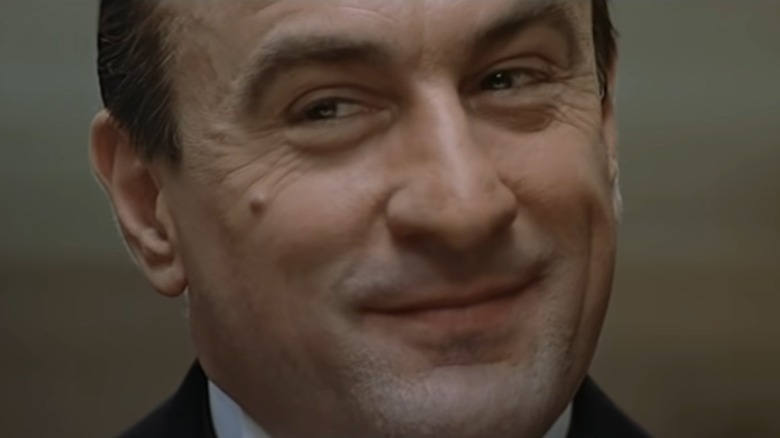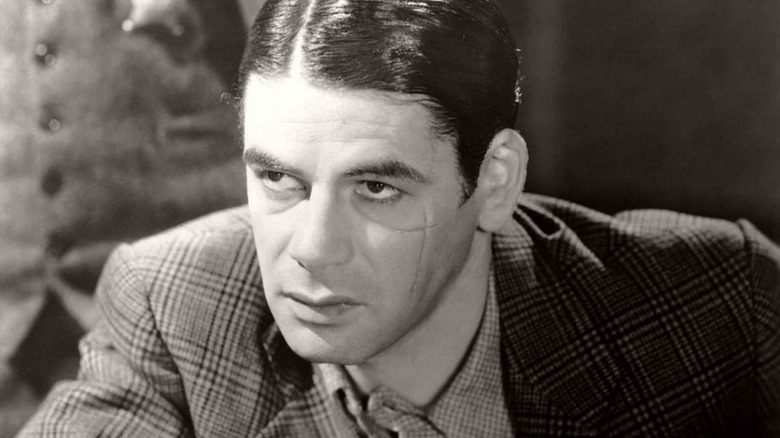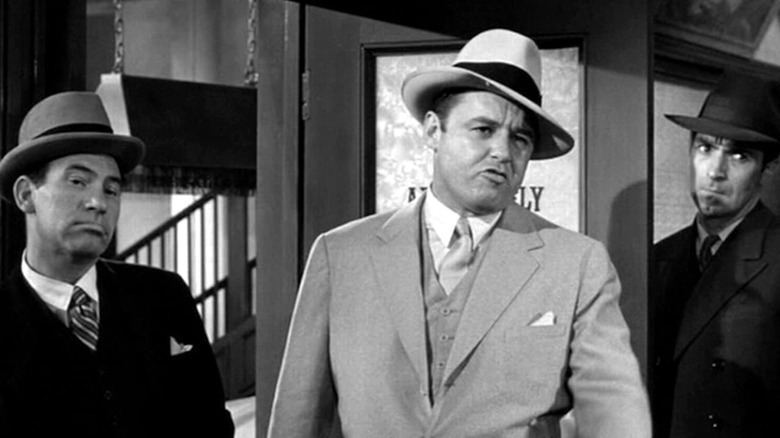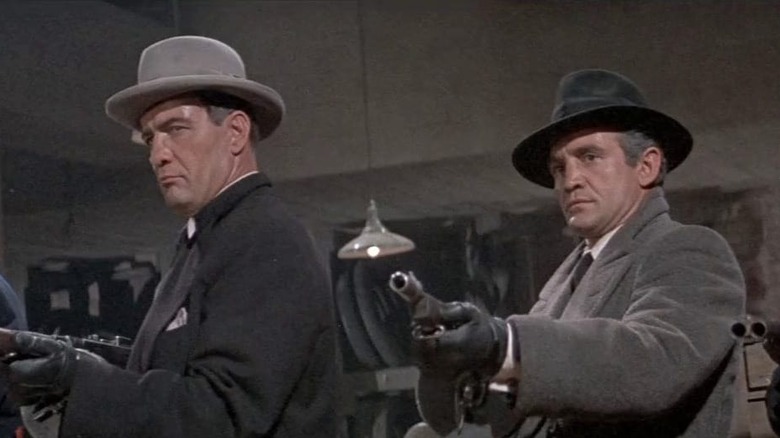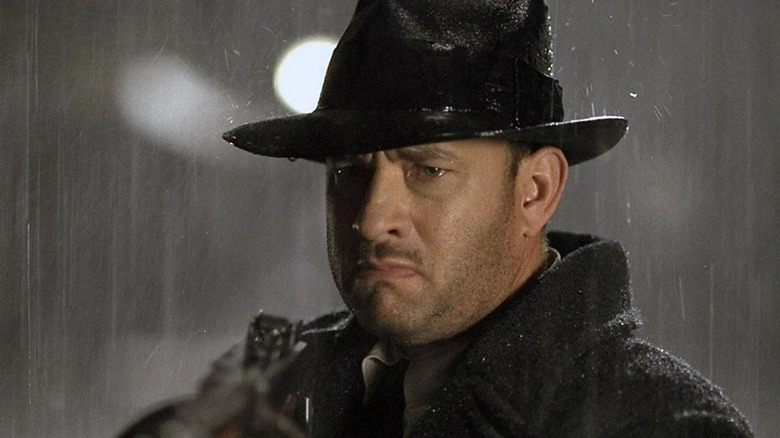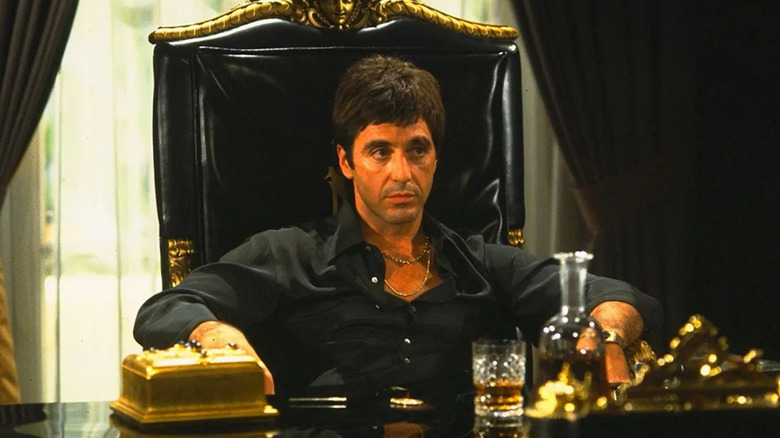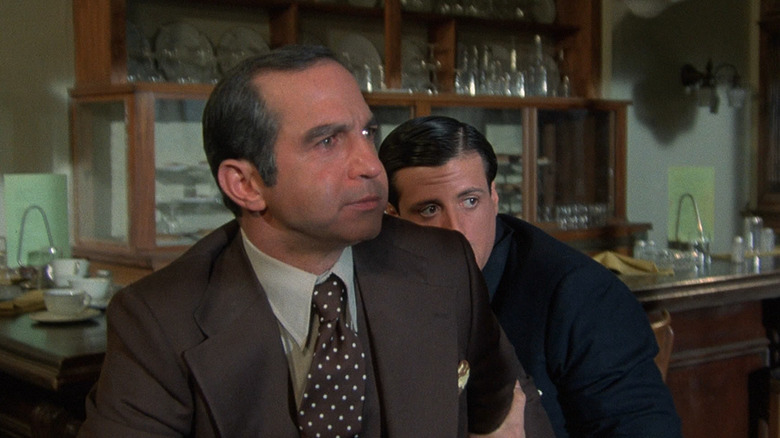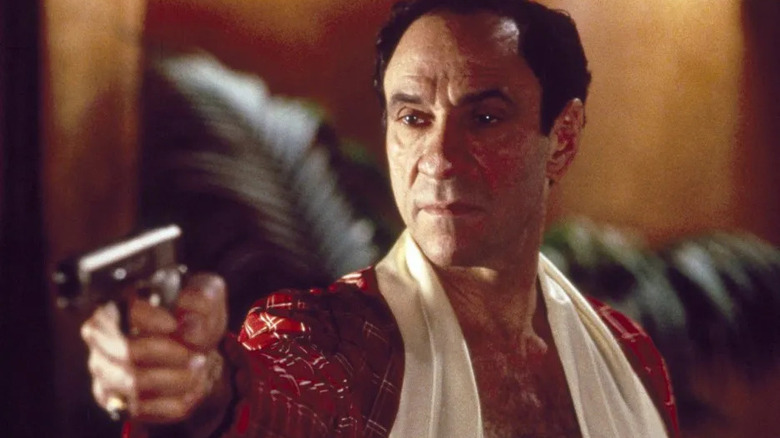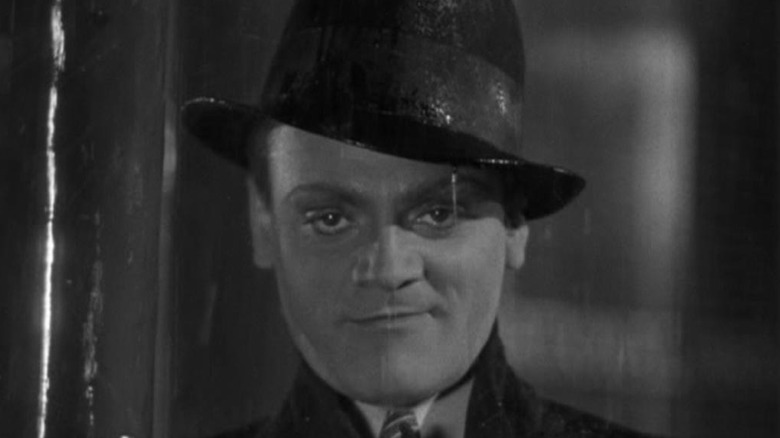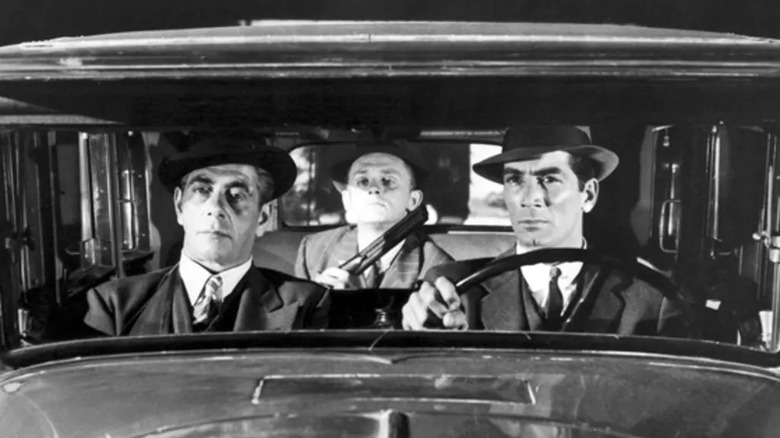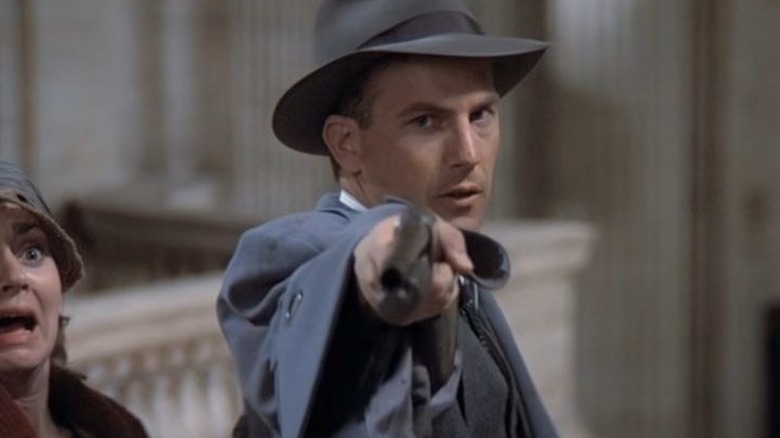10 Gangster Movies About Al Capone You Should Try Next
Born at the start of the 20th century in the Big Apple, Al Capone has undoubtedly become a historical icon for better or for worse. His ruthless rise to power and absolutely dominant grip on the city of Chicago have left him a legacy as one of the most powerful and dangerous criminals to ever walk the Earth. With a reputation like that, it should be no surprise that his life story has become the go-to inspiration for many gangster films, with some even going as far back as when Capone was still roaming free as head of the Chicago Outfit.
Despite his massive impact on pop culture, there surprisingly aren't too many great movies about the infamous crime boss. Some modern adaptations like "Gangster Land" have failed to dazzle audiences, and other titles like Tom Hardy's "Capone" gave us depictions of the Big Fellow that just didn't sit right. That being said, with over 90 years of filmmaking between Capone's life of crime and now, we've managed to find a handful of movies that should make any fan of gangster flicks happy. Here are some great films about the notorious Al Capone that you should consider watching next.
Scarface (1932)
Despite being short-lived, the era of what's now known as Pre-Code Hollywood is remembered for defying many of the norms we associate with typical classic films. Sanitized depictions of society were few and far between, and more realistic, sometimes even provocative stories were allowed to take center stage. Such is the case with 1932's "Scarface," which still never went so far as to name drop its criminal inspiration. Given that the chilling title was one of Capone's most well-known nicknames, however, it's pretty obvious what the creators were going for.
On the streets of Chicago during the 1920s, gangster Antonio Camonte, better known as Tony, is rising through the ranks of the criminal underworld. After betraying the head of his syndicate and being placed in charge of their bootlegging operations, his lust for power continues. Before long, he becomes the head of the entire organization and is locked in a deadly battle with other gangs for control of the city.
Though the film shouldn't be confused with another movie released a little over half a century later starring Al Pacino, you'd be forgiven for picking up on certain similarities, as both titles are based on a 1930 novel of the same name by Armitage Trail. And though this pick is likely older than just about every one of our readers, it's a great choice if you're looking for a good example of Pre-Code Hollywood or just a classic gangster flick.
Al Capone
With the rigid enforcement of the Hays Code coming to pass in 1934, it would be a while before audiences could once again enjoy films whose content fell outside its tight restrictions. And though it was released in 1959, a little less than a decade before the restrictions would finally come to an end, "Al Capone" foreshadows the code's demise in a few subtle ways. The biographical drama is also notable as the first time Capone was depicted on screen by name, shedding the generic gangster stand-ins for the real deal.
Especially when you consider the time it was released, "Al Capone" is an unflinchingly accurate account of the mobster's rise to power in Chicago. Everything from his earliest days as a low-level crook running bootlegging operations to his eventual succession as the de facto ruler of Chicago is covered. And since it doesn't fall victim to reveling in any of the melodrama you might expect, this is one pick that still holds up today for audiences interested in Al Capone's history. It's maybe more of a museum piece than a timeless classic, but there's definitely a lot of fun to be had here for fans of the genre in particular.
The St. Valentine's Day Massacre
Headed up by prolific producer Roger Cormen and released in 1967, "The St. Valentine's Day Massacre" focuses on the war between the North and South Side gangs being waged over the future of Chicago's criminal enterprises. Looking to put an end to the conflict, Al Capone's own South Side gang concocts an elaborate and sneaky scheme to deliver a killing blow to their rival. Posing as police officers, Capone's men ambush seven members of the North Side gang and brutally gun them down in a Chicago warehouse. And though the head of the North Side gang George Moran wasn't among the dead that day, it still proved too catastrophic for his gang to recover from, cementing the Chicago Outfit as the dominant force in the city.
Though he's become immortalized in pop culture, it's important to remember that Al Capone was still one of the most dangerous criminals in United States history. Ruthless acts like the Saint Valentine's Day Massacre are remembered as some of the gangster's most brutal, and an important reminder that the infamous figure was no hero. If you're interested in seeing some of those unsavory moments adapted for the big screen, then maybe give "The St. Valentine's Day Massacre" a watch.
Road to Perdition
Tom Hanks takes on the starring role in 2002's "Road to Perdition" as Michael Sullivan, a man practically born into a life of crime. Set during some of the toughest days of the Great Depression, Sullivan works as an enforcer for John Rooney, a coldhearted crime boss operating just outside the reach of the Chicago underworld. However, when Sullivan's wife and youngest son are killed as part of an internal conflict, he goes on a mission of revenge with his other son, Michael (Tyler Hoechlin). It's a grim and tense gangster saga that culminates in a violent climax.
Though "Road to Perdition" spins an original tale of hard times and harder men, it does have some important connections to Al Capone's inner circle. Frank Nitti becomes a key figure in Sullivan's plan to escape his former life and earn revenge, and while Capone himself remains unseen, his presence as the crime boss of the Windy City is certainly felt by everyone involved.
The film received widespread praise upon release, proving that the gangster genre can still survive in the modern era. "It is wonderfully acted," Roger Ebert wrote in his review. "And no movie this year will be more praised for its cinematography; Conrad L. Hall's work seems certain to win the Academy Award. He creates a limbo of darkness, shadow, night, fearful faces half-seen, cold and snow." Ebert was spot on with his prediction, as "Road to Perdition" won Best Cinematography at the 2003 Academy Awards.
Scarface (1983)
Loosely retelling the story of the 1932 film of the same name in a wholly new way, "Scarface" has become a huge cultural touchstone since its premiere in 1983. After cutting his teeth on the gangster genre early in his career with his role as Michael Corleone in "The Godfather," Al Pacino delivered a tour de force performance in "Scarface" as Tony Montana — the gutsy underworld crime lord who becomes the king of the Miami drug trade.
The film plays with the concept of the American dream by having its protagonist twist it beyond recognition. Searching for new opportunities after leaving Cuba for the United States, he discovers that the life he tried to leave behind won't be so easy to escape from. Dissatisfied with the boredom of a law-abiding life, Tony becomes embroiled progressively deeper and deeper in the world of crime boss Frank Lopez (Robert Loggia). As he realizes that life outside the law is what he does best, Tony aspires to become the greatest practitioner of his craft that the city of Miami has ever seen.
Arguably one of the best gangster movies of all time, and also one of the best remakes, it's tough to find many faults with this classic. We're all familiar with a certain scene of a gun-toting Tony introducing us to his little friend, but "Scarface" has a lot more going for it than just some memorable lines. And even though the story is very different than that of Al Capone, the real-life gangster still serves as the original inspiration.
Capone (1975)
Notable for starring Sylvester Stallone as Al Capone's bodyguard Frank Nitti just a year before his breakout role in "Rocky," "Capone" takes a far more comprehensive look at the titular criminal kingpin's life than previous films. And while it shares a title with a certain underwhelming 2020 film of the same name, "Capone" is a very different movie. It still suffers from its share of historical inaccuracies — such as Nitti meeting Capone years after he died in real life – but despite its flaws, "Capone" helped pave the way for some of the better gangster flicks that would follow in its footsteps.
The film begins during Capone's early days as a small-time criminal in New York City. As luck would have it, his misdeeds soon catch the attention of Johnny Torrio, a powerful crime boss from Chicago who offers to take the young Capone under his wing. Over the course of the next decade, Capone uses Torrio's lessons to help his mentor build a criminal empire off of dirty money, bootlegging, and blood. A failed assassination attempt in the mid-1920s results in an early retirement for Torrio, as well as an ascension to the head of the Chicago Outfit for Capone.
As anyone familiar with Al Capone's history is well aware of, however, it wasn't happily ever after for the gangster from there. Able to dodge every attack prosecutors could throw at him for a time, Capone's reign of terror finally came crashing down when he was nabbed with one charge he couldn't beat: Tax evasion.
Dillinger and Capone
Though he's arguably the most famous, Al Capone is far from the only notorious criminal to have terrorized the United States during the era of prohibition and the Great Depression. Perhaps equally as fearsome was John Dillinger, whose criminal exploits were so notorious that he was dubbed "Public Enemy Number One" by the FBI. The Navy deserter-turned-criminal went on to become one of the country's most infamous bank robbers before meeting a bloody demise in 1934. And though the two gangsters operated in and around Chicago during the same period of time in the 1930s, it's uncertain whether or not they ever actually crossed paths. The 1995 film "Dillinger and Capone" follows an alternate timeline in which Dillinger survives beyond his real-world death and crosses paths with Scarface.
The movie begins at the same theater where the real Dillinger was killed, but a case of mistaken identity results in his brother being shot dead instead and Dillinger (Martin Sheen) narrowly escaping. Years later, he's still laying low and enjoying his new life of anonymity. That all comes crashing down, however, when none other than Al Capone himself (F. Murray Abraham) waltzes out of prison and attempts to recruit Dillinger for one last high-stakes heist. Sure, "Dillinger and Capone" might throw just about every aspect of realism out the window, but it's a fun bit of historical fiction for any gangster film buff.
The Public Enemy
The oldest pick on our list, "The Public Enemy" clearly draws inspiration from the real-life dealings of Al Capone, though it refrains from invoking the mobster's actual name. In one of his first starring roles, James Cagney plays Tom Powers — a young man involved in the Chicago underworld from a young age. Tom and his friend Matt Doyle are eventually crossed by their unsavory employer, leading them to become even more entrenched in their lives of crime.
The onset of the First World War sees Tom's older brother Mike head overseas, who was the last person in Tom's life trying to convince him to stay on the right side of the law. The passing of the 18th Amendment and the ban on alcohol nationwide then opens the door for Tom to make serious money as a bootlegger, which introduces even more danger to his life. Rival gangs soon want a piece of his profits for themselves, with the subsequent gang war threatening more lives than just Tom's.
Most films released during the Pre-Code Hollywood era weren't afraid to take a gritty look at society's less admirable aspects. And with the likes of Al Capone still operating in Chicago and organized crime running rampant throughout the country at the time of the film's 1931 release, the subject matter in "The Public Enemy" was likely all too familiar to most audiences.
The George Raft Story
The life of Hollywood actor George Raft was tumultuous to say the least. Born and raised in a hardscrabble part of New York City, he first found success as a dancer before making his way to Hollywood. His on-screen talent was soon recognized, helping him to rise from bit parts to leading roles in major films like the original 1932 "Scarface." Though Raft's status as a Hollywood star didn't follow him throughout the rest of his life, his questionable connections to the lifestyle he portrayed on screen certainly did.
Falling somewhere in between the realms of truth and fiction, "The George Raft Story" showcases many of the major events of the famous actor's life. Most notable is his chance meeting with Al Capone himself after the release of "Scarface," which was clearly based on the gangster's real life. That's not the only unsavory character who Raft involved himself with, however — at least according to the film — as he's frequently shown trying to balance his suspicious friendships with his public image. While it's tough to prove whether or not Raft truly rubbed elbows with some of the biggest names in the criminal underworld, the FBI certainly had their suspicions. Because "The George Raft Story" came out in 1961, it may not hold as much appeal to casual movie fans, but if you're a diehard follower of the gangster genre, it's a curious look at one of the first men to play Al Capone on screen.
The Untouchables
No list of Al Capone movies would be complete without "The Untouchables." Though it takes more than a few creative liberties, the film has become an enduring classic since its 1987 release. The phenomenal casting only further elevates "The Untouchables" to legendary status, with the likes of Kevin Costner, Sean Connery, and Robert De Niro all in lead roles. And even with its embellishments, there's still a kernel of truth to the story of Elliot Ness.
Despite being a Capone film, "The Untouchables" is just as much about the Federal Agents trying to bring Scarface to justice. Set in the early 1930s, the film shows a Chicago Outfit that had crushed nearly all criminal opposition. From the cops to the politicians, no one can muster the necessary force to bring Capone down thanks to his incredible influence. That is, of course, until Eliot Ness is assigned to the case. Disgusted by the greed and ineptitude of his fellow officers, Ness assembles a team made up of the best of the best. With nerves of steel and an uncanny resistance to bribery, the group begins to gain ground against Capone and his men.
Amidst a number of titles released long before color films and other entries that are only loosely inspired by the real Chicago gangland, "The Untouchables" is a refreshing and fun take on the gangster genre. Even today, the film remains a favorite of both critics and fans, making it both one of the best Al Capone films ever and one of the most influential gangster movies ever made, period.
